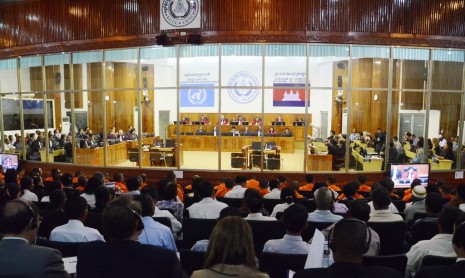When the international community hammered out a hard-fought deal with the government in 2001 for a war crimes tribunal to try the most senior leaders of the Khmer Rouge regime, they hoped their efforts would also set an example for a local court system riddled with corruption and political influence.
The tribunal’s lasting legacy, they said, would be to act as a model for the national courts.
“When we’re talking about legacy, we’re talking about what this court has done and ways in which it can help build the rule of law in this country,” Stephen Rapp, America’s ambassador-at-large for global criminal justice, said in Phnom Penh last month.
The U.S. pledged another $5 million to the Extraordinary Chambers in the Courts of Cambodia (ECCC) during Mr. Rapp’s visit.
On Monday, five years after proceedings at the tribunal started and over $160 million in funding, independent radio station owner Mam Sonando was jailed for 20 years by the Phnom Penh Municipal Court.
Human rights groups are calling the Sonando case one of the most blatant politically motivated trials in recent years, and countries funding the Khmer Rouge tribunal have also condemned the verdict.
Far from setting a good example, the Khmer Rouge tribunal may have done just the opposite, said Rupert Abbott, Amnesty International’s Asia researcher for Cambodia.
One such example, Mr. Abbott said, was when Prime Minister Hun Sen in 2010 told visiting U.N. Secretary-General Ban Ki-moon that he would not allow cases 003 and 004 at the ECCC to move ahead.
“The one dangerous message is political control, and the second dangerous message is impunity,” Mr. Abbott said, “of justice only for people the government wants there to be justice for.”
Of the tribunal’s legacy, he added: “When we see a case like this [Sonando’s], and the ongoing cases at the local level where courts aren’t ruling in the people’s favor, I think we can see that there hasn’t been a short-term impact on the local courts.”
The Phnom Penh Municipal Court convicted Mr. Sonando on Monday on six charges related to fomenting an alleged secessionist movement in a rural pocket of Kratie province wrapped up in a long-running land dispute with a local rubber company.
But after a four-day trial last month, rights groups who followed the proceedings dismissed the evidence against Mr. Sonando and his alleged role in one as ludicrous.
Clair Duffy, a tribunal monitor for the New York-based Open Society Justice Initiative, said the tribunal’s possible legacy would only be known well into the future.
While the tribunal has already helped improve the skills of some local judges and lawyers, the court system remains unchanged, Ms. Duffy said.
“In terms of real questions of judicial independence and separation of powers, it’s hard to see much improvement in the legal system at all over the lifespan of the [tribunal],” she said.
What matters is not a judge’s or a lawyer’s skill, she said: “All of this comes down to political will. Judicial independence and genuine separation of the courts from the executive depends entirely on political will.
“Look at the history of cases 003 and 004. Not a single Cambodian decision-maker—prosecutor, co-investigating judge, pre-trial chamber judge—has ever been able to stand up against the government’s publicly expressed will on those cases,” she said.
“The Mam Sonando verdict demonstrates that in Cambodia, on politically charged issues, judicial independence is still elusive.”
Cheam Channy, a longtime lawmaker for the opposition Sam Rainsy Party, said he was reminded of his own imprisonment in 2005 by the country’s military court when he heard of Mr. Sonando’s conviction.
A military court sentenced Mr. Channy to seven years in jail for allegedly attempting to recruit a private army. Mr. Channy said he was merely in charge of one of his party’s shadow ministries involved with defense, the normal work of any opposition.
At the time, human rights groups condemned the verdict on several grounds: that the military court had no jurisdiction in the case of a civilian, that the National Assembly lifted Mr. Channy’s parliamentary immunity unconstitutionally, and his lawyer was barred from cross-examining the prosecution’s witnesses and from calling any witnesses on behalf of his client.
Then as now, Mr. Channy said, “the courts are still under government pressure.”
Japan, by far the tribunal’s biggest donor at $76 million, declined to comment on Mr. Sonando’s conviction or what it says about the tribunal’s legacy. Japan is also deeply involved in efforts to reform Cambodia’s legal and judicial systems.
The European Union (E.U.), many of whose members help keep the tribunal financially afloat, said it still hoped their efforts would make a difference.
“The E.U. believes that the work of the [tribunal]…can contribute to combating a culture of impunity, and it is within this context that the E.U. and its member states support the ECCC,” said Jean-Francois Cautain, the E.U.’s ambassador to Cambodia.
(Additional reporting by Khuon Narim)




